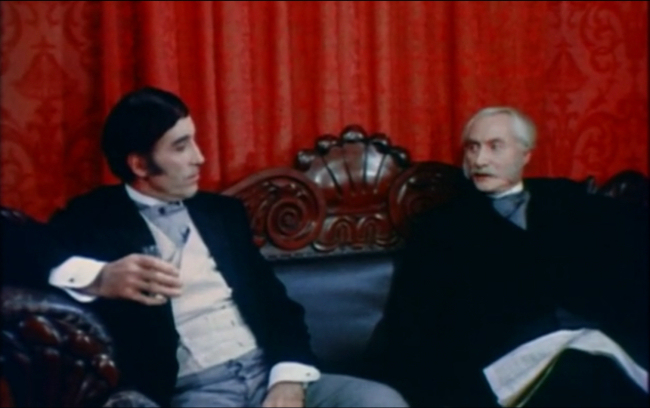
The most accurate Jekyll and Hyde adaptation I've seen so far doesn't even have a character named Jekyll or Hyde. 1971's I, Monster was released the same year as Hammer's Doctor Jekyll and Sister Hyde and featured Hammer's two top stars, Peter Cushing and Christopher Lee, but came from Hammer's rival, Amicus. The box office was apparently not as kind to I, Monster but Amicus won in the long run with this film--a much more cerebral take that makes much--perhaps too much--of Freud's ideas partly anticipated by Robert Louis Stevenson in his work. It also has some great atmosphere and performances.

For some reason, the name of Henry Jekyll is changed to Charles Marlow and Edward Hyde is changed to Edward Blake--all other names remain the same as those in the source material--Lanyon, Enfield, Poole, and, most surprisingly, Utterson.

The protagonist of the novella, Utterson almost never figures in adaptations at all, much less in the prominent role he occupies here. And Peter Cushing is very well cast in the role--one can almost see him in the opening lines of the novella:
Mr. Utterson the lawyer was a man of rugged countenance, that was never lighted by a smile; cold, scanty and embarrassed in discourse, backward in sentiment; lean, long, dusty, dreary and yet somehow loveable.

Peter Cushing was born to hold a cat.
The film suffers, though, from missing what seems to me the crucial aspect of Utterson's character. The novella describes him as having "an approved tolerance for others; sometimes wondering, almost with envy, at the high pressure of spirits involved in their misdeeds; and in any extremity inclined to help rather than to reprove." This is what makes him an appropriate adversary for Jekyll, whose object is moral purity. Utterson is a tolerant man who would sooner see the humanity he has in common with sinners than to try to purge them.

But the absence of this character trait may be related to the film's introduction of explicit references to Freud. In this version, Marlowe--Jekyll--is a sort of psychotherapist and we see him apply his concoction to two patients, for both having the effect of liberating their ids, allowing them to achieve catharsis by acting out repressed feelings.

This version introduces fewer female characters than other adaptations--Marlowe has neither wife or fiancee--but there is an effective scene early on where a female patient (Susan Jameson) comes across Marlowe's porn stash while he's in the other room.

No doubt it's her discovery of the doctor's repressed libido that partly inspires her when she's taken the drug to try to seduce him--but Marlowe is far too composed to take advantage of her. Christopher Lee is great in this and he seems to have an understanding of the role much like John Barrymore's--he plays Marlowe/Jekyll as an increasingly brittle mask for the reality of Blake/Hyde.

We don't see Blake lusting after women very much, though still more than we do in the novella. The man he kills in the novella is swapped out for a prostitute who rejects him in a tavern. Blake's assault of her later doesn't seem sexual--he beats her in the skull with his cane, as he does the man in the novella. And, as in the novella, the cane breaks and becomes a crucial piece of evidence but instead of it being a gift from Utterson its significance becomes its resemblance to a cane Marlowe describes his father owning and using to physically abuse him. So the filmmakers here have dialled the Freud up a bit higher. It's effective, too, suggesting Blake/Hyde is partly a manifestation of Marlowe/Jekyll's issues with his father.

I would have liked it if Blake didn't resemble Marlowe so much though Lee does a good job of creating an impression of a different person just through mannerisms and posture. He kind of looks like Terry Jones sometimes.

Twitter Sonnet #1102
Excessive feet delivered fast the bell.
The windward tack rewards with broken yard.
Escape refurbished spring with chilly Hell.
In leather pocket dwelt the horrid card.
A resting league surveyed a waiting rock.
By clouds and moon and watchful faces keeps.
A host below abides for nature's clock.
An hour hand composed of mountains sweeps.
The echoes of transparent hooves arose.
The time diminished marked in shrinking skies.
The pebbles fall above in ragged rows.
The land's receding now bereft of eyes.
A hardened net restrains relieving goods.
The endless grid of hedges grew to woods.

No comments:
Post a Comment